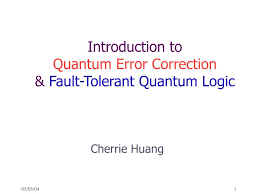Quantum computing has emerged as a revolutionary technology with the potential to solve complex problems beyond the capabilities of classical computers. However, the practical implementation of quantum computing faces significant challenges, one of the foremost being quantum errors. Quantum error correction is a crucial aspect of quantum computing that addresses these challenges.
Understanding Quantum Errors
Quantum errors refer to deviations from the ideal behavior of quantum systems. These errors can arise due to various factors, including environmental noise, imperfect control operations, and hardware imperfections. Understanding the nature of quantum errors is essential for developing effective error correction strategies.
Types of Quantum Errors
Quantum errors can manifest in different forms, such as bit-flip errors, phase-flip errors, and depolarizing errors. Bit-flip errors occur when a qubit’s state flips from 0 to 1 or vice versa, while phase-flip errors involve changes in the qubit’s phase. Depolarizing errors represent a general type of error where the qubit’s state undergoes random alterations.
Causes of Quantum Errors
Several factors contribute to the occurrence of quantum errors, including decoherence, which results from interactions with the surrounding environment, as well as intrinsic imperfections in quantum hardware and control mechanisms.
The Importance of Quantum Error Correction
Quantum error correction is essential for realizing the full potential of quantum computing while mitigating the impact of errors on computation results. Without effective error correction techniques, the reliability and scalability of quantum computers would be severely limited.
Quantum Computing Potential
Quantum computers have the potential to revolutionize various fields, including cryptography, drug discovery, and optimization problems. However, harnessing this potential requires overcoming the challenges posed by quantum errors.
Quantum Error Challenges
Quantum errors present unique challenges due to the delicate nature of quantum information. Unlike classical bits, which are deterministic, qubits are susceptible to errors and require specialized techniques for error detection and correction.
Challenges in Implementing Quantum Error Correction
Implementing quantum error correction poses several challenges due to the inherent complexity of quantum systems and the presence of noise and errors.
Complexity of Quantum Systems
Quantum systems are highly complex, with qubits interacting with each other in intricate ways. Designing error correction schemes that account for this complexity is a non-trivial task.
Decoherence and Noise
Decoherence, caused by interactions with the environment, leads to the loss of quantum coherence and is a major source of errors in quantum systems. Additionally, noise from various sources further complicates error correction efforts.
Quantum Gate Errors
Quantum gates, which perform operations on qubits, are susceptible to errors due to imperfections in hardware and control mechanisms. Minimizing gate errors is crucial for achieving reliable quantum computation.
Fault-Tolerant Quantum Computing
Achieving fault-tolerant quantum computing, where errors can be detected and corrected efficiently, is a significant milestone in quantum error correction research. However, implementing fault-tolerant schemes poses formidable challenges.
Current Approaches to Quantum Error Correction
Researchers have developed various approaches to quantum error correction, including the use of quantum error correction codes and advanced error-detecting techniques.
Quantum Error Correction Codes
Quantum error correction codes, such as the Shor code and the Steane code, encode quantum information redundantly to protect against errors. These codes enable the detection and correction of errors without compromising the integrity of quantum computations.
Error-Detecting and Error-Correcting Codes
Error-detecting and error-correcting codes play a crucial role in identifying and correcting errors in quantum systems. These codes employ sophisticated algorithms to detect errors and recover the original quantum state.
Topological Quantum Codes
Topological quantum codes, based on the principles of topology, offer robust protection against errors by encoding information in non-local degrees of freedom. These codes are resilient to local errors and hold promise for fault-tolerant quantum computing.
Strategies for Overcoming Quantum Error Challenges
Researchers are exploring various strategies to overcome the challenges posed by quantum errors, including the development of error correction algorithms and quantum error mitigation techniques.
Error Correction Algorithms
Error correction algorithms play a pivotal role in identifying and correcting errors in quantum systems. These algorithms leverage mathematical techniques to efficiently detect and correct errors while minimizing computational overhead.
Quantum Error Mitigation Techniques
Quantum error mitigation techniques aim to reduce the impact of errors on computation results without fully correcting them. These techniques include error suppression, error extrapolation, and error mitigation through error-correcting codes.
Future Directions in Quantum Error Correction
The field of quantum error correction is continuously evolving, with ongoing research focused on advancing quantum hardware and developing novel error correction strategies.
Advancements in Quantum Hardware
Advancements in quantum hardware, such as error-resistant qubits and fault-tolerant architectures, are essential for realizing the full potential of quantum error correction. Researchers are exploring new materials and fabrication techniques to improve the reliability and scalability of quantum computers.
Quantum Error Correction Research
Ongoing research in quantum error correction aims to address fundamental challenges and develop practical solutions for mitigating quantum errors. Collaborative efforts between academia, industry, and government institutions are driving innovation in this field.
Conclusion
Quantum error correction is a critical aspect of quantum computing that addresses the challenges posed by quantum errors. By developing effective error correction techniques, researchers can enhance the reliability and scalability of quantum computers, paving the way for transformative applications in various domains.

